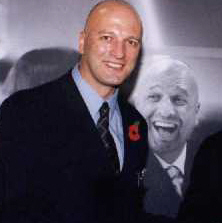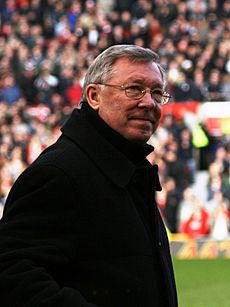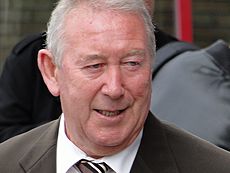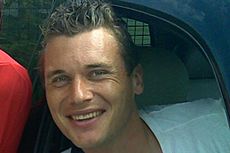Bryan Gunn facts for kids

Gunn at his own-named catering facility club at Carrow Road in November 2007
|
|||
| Personal information | |||
|---|---|---|---|
| Full name | Bryan James Gunn | ||
| Date of birth | 22 December 1963 | ||
| Place of birth | Thurso, Scotland | ||
| Position(s) | Goalkeeper | ||
| Youth career | |||
| 1979–1980 | Invergordon | ||
| 1980–1982 | Aberdeen | ||
| Senior career* | |||
| Years | Team | Apps | (Gls) |
| 1982–1986 | Aberdeen | 15 | (0) |
| 1986–1998 | Norwich City | 390 | (0) |
| 1998 | → Hibernian (loan) | 12 | (0) |
| 1998–1999 | Hibernian | 0 | (0) |
| Total | 417 | (0) | |
| International career | |||
| 1990–1994 | Scotland | 6 | (0) |
| Managerial career | |||
| 2009 | Norwich City | ||
| *Club domestic league appearances and goals | |||
Bryan James Gunn (born 22 December 1963) is a Scottish former professional goalkeeper and football manager. He started his career at Aberdeen in the early 1980s. He spent most of his playing days at Norwich City, where he became a club legend. After Norwich, he played briefly for Hibernian in Scotland before retiring in 1998.
Gunn considers his best moment as a player to be a crucial save he made. This happened during a UEFA Cup match against Bayern Munich in 1993. This game is often called the highlight of Norwich City's history. He is one of only nine Norwich players to win the club's Player of the Year award twice. He was also one of the first people inducted into Norwich City's Hall of Fame. Bryan Gunn also played six times for the Scotland national football team in the early 1990s.
After retiring as a player, Gunn worked for Norwich City in various roles. These included hosting match days and coaching. He became the temporary manager near the end of the 2008–09 season. He was then made the permanent manager that summer. However, he lost his job a week into the 2009–10 Football League One season. This followed a tough 7–1 home defeat to local rivals Colchester United.
Since his young daughter passed away from leukaemia in 1992, Gunn has worked hard to raise money. He supports efforts to fight the disease and help those affected. By 2011, he had raised over £1 million for childhood leukaemia research. This money has helped fund projects to improve the lives of children with leukaemia and their families. One notable project is a national telephone support line. The city of Norwich recognized his charity work and long connection with the football club. They named him Sheriff for 2002. His autobiography, In Where it Hurts: My Autobiography, was published in 2006. It includes a special introduction by his former manager, Alex Ferguson.
Contents
Early Life and Football Dreams
Bryan Gunn was born on 22 December 1963 in Thurso, Scotland. His father, James Gunn, was a lorry driver and an amateur sportsman. He played football and won medals at Highland games. Bryan's mother, Jessie Sinclair, worked in a canteen.
The Gunn family lived on a farm in Thurso. Young Bryan loved football and would often ask the farmhands to play with him. If they didn't have a ball, they would use a turnip! By age four, he was already keen on being a goalkeeper. He was brave and enjoyed diving for the ball. When Bryan was four and a half, his family moved to Invergordon. He joined his school football team there. He played as an outfield player until the main goalkeeper moved to secondary school.
Bryan attended Invergordon Academy from 1975 to 1980. He earned good grades in subjects like English and maths. At 13, he was invited to play for the Invergordon F.C. under-15 team. His performances caught the eye of national selectors. Around the same time, at age 14, he joined Aberdeen. He also joined the Scotland under-15 squad.
Playing Career Highlights
Starting at Aberdeen

Bryan Gunn began his professional football journey with Aberdeen in 1980. He developed a good relationship with Aberdeen manager Alex Ferguson. Ferguson even brought Manchester United to Carrow Road for Gunn's special match in 1997. As a young player at Aberdeen, Gunn often babysat Ferguson's children. He once joked, "I probably babysat more than I played."
When he was younger, Gunn didn't always play in goal. Ferguson remembered that he once played Gunn as a forward in a reserve match. Gunn even scored a great goal! But as he grew taller, Gunn became a full-time goalkeeper. He credits much of his success to Marc De Clerck, a special goalkeeping coach at Aberdeen. De Clerck taught Gunn and other goalkeepers new training methods.
Gunn made his first team debut for Aberdeen on 30 October 1982. He played against Hibernian at Pittodrie. He kept four clean sheets for the club. Even though they were rivals for a spot, Gunn had a great friendship with the main goalkeeper, Jim Leighton.
Gunn's hard work paid off. He was called up for the Scotland under-21 team in November 1983. He also won medals with Aberdeen's reserve team. At a senior level, he received medals for winning the Scottish League Cup and the European Cup Winners Cup. He was a substitute in both finals. He made a surprise appearance in a 1986 European Cup quarter-final against Gothenburg. The main goalkeeper lost his contact lenses, so Gunn had to step in! He played very well in that match.
Since Jim Leighton was the main goalkeeper, Alex Ferguson promised to help Gunn find another club. In October 1986, Ferguson sold Gunn to Norwich City for £100,000.
Life at Norwich City
Bryan Gunn found it easy to settle in Norwich. He said it was "a bit like Aberdeen in many ways." He joined the club during the season, so it was hard to become the first-choice goalkeeper right away. Norwich had just sold their England international goalkeeper, Chris Woods. Another goalkeeper, Graham Benstead, was playing well.
Gunn made his league debut for Norwich on 8 November 1986. It was a 2–1 win against Tottenham Hotspur. In his first season, Norwich finished fifth in the First Division. This was their highest league finish at the time. By May 1988, Gunn was playing so consistently that his value had increased a lot.
Norwich reached the semi-final of the FA Cup in 1989 with Gunn in goal. A very famous moment for Gunn and Norwich happened in 1993. They achieved a stunning victory over European giants Bayern Munich in the UEFA Cup. This match is seen as the peak of Norwich City's history. Gunn made several amazing saves that helped Norwich stay in the game. He calls one save from Bayern striker Adolfo Valencia the best of his career.
In November 1989, Gunn was involved in a memorable incident during a match against Arsenal. The game was tied 3–3 in the final seconds when Arsenal was given a penalty kick. Gunn saved the shot, but the ball wasn't cleared. A scramble happened, and the ball went into the net. The goal was given, and a big argument broke out between players from both teams. Gunn tried to break it up. The next day, newspapers called it "The Highbury Brawl." Gunn was warned about his future behavior, and both clubs were fined.
Under manager John Deehan, Norwich was doing well in the Premier League in the 1994–95 season. But then Gunn broke his ankle while playing. His injury showed how important he was to the team. Norwich then struggled, winning only one of their last 17 games. The team was eventually relegated. Gunn continued to play regularly and became team captain in 1996.
Gunn's last first-team game for Norwich was on 31 January 1998. He played 478 games for Norwich in total. He was voted Norwich City Player of the Year in 1988 and 1993. The 1993 award came after Norwich finished third in the Premier League, their best-ever performance. The club held a special match for Gunn in 1996, where Alex Ferguson brought Manchester United to play.
Moving to Hibernian
In the 1997–98 season, a new goalkeeper named Andy Marshall started playing well for Norwich. This meant Gunn had fewer chances to play. So, in February 1998, he joined Hibernian in Scotland. He was first on a loan, but then it became a permanent transfer for £25,000.
Gunn felt it was hard to leave Norwich after 12 great years. He joined Hibernian when they were at the bottom of the Scottish Premier Division. Alex McLeish had just become their manager. Gunn couldn't save the club from being relegated. However, he signed a two-year contract in July 1998. Sadly, a leg injury he got in 1998 ended his playing career. He officially retired in March 1999.
Despite the challenges, Gunn enjoyed his time at Hibernian. He played 12 games and helped them beat their rivals, Hearts, in a local derby. He also kept a clean sheet at Celtic Park. He received a warm welcome from Aberdeen fans when he played against his old club.
Playing for Scotland
Bryan Gunn played for Scotland at youth levels. He was part of the squad that won the 1982 UEFA European Under-18 Football Championship.
In 1983, Gunn traveled to Mexico with the Scotland Under-19s for the 1983 FIFA World Youth Championship. He played in all four of Scotland's matches. In one game against South Korea, the crowd threw coins and rotten fruit at him. He called it "a nightmare" but played one of his best games, keeping a clean sheet. Scotland's coach, Andy Roxburgh, praised his performance.
Gunn played six times for the senior Scotland national team. He was part of the squad for the 1990 FIFA World Cup. However, he didn't play in any of Scotland's three matches. He was the third-choice goalkeeper. His debut for Scotland was in a friendly match against Egypt. He was involved in two Egyptian goals, and Scotland lost 3–1. His last game for Scotland was in May 1994, as a substitute against the Netherlands.
Life After Playing
Coaching and Club Roles
Bryan Gunn earned his coaching certification in 1983 while still at Aberdeen. After retiring from playing in 1999, he first worked in hospitality at Carrow Road. He worked in "The Gunn Club," a food area named after him.
Over the years, Gunn moved into other roles at Norwich. He was the sponsorship manager from 1999 to 2006. In 2007, manager Peter Grant moved Gunn into sports management. He helped with player transfers and loan signings, using his contacts from his playing career.
When Glenn Roeder became manager in November 2007, Gunn became the goalkeeping coach. This was his first official coaching job. Later, he was promoted to head of player recruitment while still coaching goalkeepers.
Managing Norwich City
In January 2009, Glenn Roeder was sacked as Norwich manager. Gunn was asked to take temporary charge of the team. He told the players they had "let people down." In his first match as caretaker manager, Norwich won 4–0 against Barnsley. The fans gave him a great welcome. A Facebook group called "Bryan Gunn for manager," started by his daughter, quickly gained many members. On 19 January 2009, he was appointed manager until the end of the season.
Gunn brought in former Norwich players to help him. Ian Crook became the first-team coach, and John Deehan became the chief scout. However, the team's good start didn't last. Norwich lost their last three games of the season and were relegated from the Championship. Gunn called his players an "embarrassment" after the 4–2 defeat that sealed relegation. This meant Norwich would play in the third tier of English football for the first time in nearly 50 years.
Despite the relegation, Gunn decided to stay on as manager for the 2009–10 season. He felt he had to try and fix things. He signed 12 new players, including Australian goalkeeper Michael Theoklitos. Norwich had a good pre-season, winning all their friendly matches.
The first game of the new season was at home against rivals Colchester United. Gunn's team suffered a shocking 7–1 defeat. The new goalkeeper, Theoklitos, was heavily criticized. Fans reacted strongly to Norwich's worst-ever home defeat. Some fans even threw their season tickets at Gunn. Many walked out before the match ended, and there was a protest outside the stadium. Six days after the defeat, on 14 August 2009, Gunn was sacked as manager.
Gunn's time as manager at Norwich was his only experience in professional football management. He says his only regret is that some fans might only remember him as the manager who lost 7–1.
After Football and Family Life
In November 2009, Gunn started a new job as director of business development for OneStream. In 2011, he left that role to become a sports agent. In this new job, he helps recruit young footballers.
Gunn's wife, Susan, is a painter. She won a major art prize in 2008. Before they met, Susan was a beauty queen and model. They met in Spain, and Bryan proposed within three days. They married the following year. They lived near Norwich for many years before moving to Cheshire in May 2011.
The Gunns have three children: Francesca, Melissa, and Angus. Melissa is a model. Angus is also a footballer and plays as a goalkeeper, just like his father. Angus played for Norwich City as a youth player. In October 2010, he was chosen for the England under-16s. In July 2011, Angus joined Manchester City. Angus rejoined Norwich on loan in June 2017. He then played for Southampton before returning to Norwich. Angus also played for the England under-21 football team. In March 2023, he decided to play for the Scotland senior team, like his father.
Bryan Gunn has a spinal condition called ankylosing spondylitis, which he manages with medication. His autobiography, In Where it Hurts, was published in 2006. The book was praised for its humor and observations. The publishers agreed to donate money from each book sale to Gunn's Leukaemia appeal.
Bryan Gunn's Leukaemia Appeal
In 1992, Gunn's two-year-old daughter, Francesca, was diagnosed with leukaemia. Norwich City fans were surprised when Gunn shaved his head. He did this to show Francesca that it was okay for her hair to fall out during chemotherapy. When people learned the reason, he received support from across the sporting world and from the people of Norfolk.
Francesca passed away in 1992, at age two. Just days after her death, Gunn played a match for Norwich. He said that when he ran out, he felt the whole stadium was with him. He never thought about quitting football. At the end of that season, Gunn won Norwich's Player of the Year award. The club finished third in the Premier League, their highest-ever league position.
After Francesca's death, Gunn started "Bryan Gunn's Leukaemia Appeal." This fund raises money to fight the disease. He first aimed for £10,000, but by 2011, he had raised £1,000,000. The fund helps in three main ways:
- Equipping local hospitals to better care for children with leukaemia.
- Providing extra training for nurses and staff who care for these children.
- Supporting more research into the causes and cures of leukaemia.
The research funding has helped the University of East Anglia in Norwich become a leading center for leukaemia research. Gunn also set up a telephone support line called gaps:line (Gunn Appeal Parent Support). This service offers advice and help to parents of children with leukaemia or other cancers. It started in Norfolk in 2004 and became a national service in 2006.
Playing Style and Legacy
As a player, Bryan Gunn was known as "a leader with a big presence." His former manager, Alex Ferguson, described him as a "warm, outgoing and endearing character." Ferguson also said Gunn was a "tremendous young keeper" who was always professional and committed.
Gunn had a fantastic connection with Norwich supporters. During games, he liked to playfully tease the crowd. Before each half, he would run towards his goal and pretend to headbutt the crossbar. Norwich fans noticed this and would cheer him on. Gunn loved it and sometimes came very close to hitting the woodwork!
Gunn is considered "a legend in Norwich" because of his many years playing and working for the club. In 2002, he was one of the first 25 people inducted into the Norwich City Hall of Fame. In a 2005 fan poll, Gunn was voted "Norwich's cult hero," receiving 37% of the votes. He is one of only nine players to win the Norwich City Player of the Year award twice (in 1988 and 1993). He is the only goalkeeper to do so. In 2003, he received an "Outstanding Contribution to the Community" award from the Premier League. In recognition of his achievements and charity work, the City Council made Gunn Sheriff of Norwich for the year in 2002.
Career Statistics
| Club | Season | League | National cup | League cup | Europe | Total | ||||||
|---|---|---|---|---|---|---|---|---|---|---|---|---|
| Division | Apps | Goals | Apps | Goals | Apps | Goals | Apps | Goals | Apps | Goals | ||
| Aberdeen | 1982–83 | Scottish Premier Division | 1 | 0 | 0 | 0 | 0 | 0 | 0 | 0 | 1 | 0 |
| 1983–84 | 0 | 0 | 0 | 0 | 0 | 0 | 0 | 0 | 0 | 0 | ||
| 1984–85 | 2 | 0 | 0 | 0 | 0 | 0 | 0 | 0 | 2 | 0 | ||
| 1985–86 | 9 | 0 | 1 | 0 | 2 | 0 | 1 | 0 | 13 | 0 | ||
| 1986–87 | 2 | 0 | 0 | 0 | 2 | 0 | 0 | 0 | 4 | 0 | ||
| Total | 14 | 0 | 1 | 0 | 4 | 0 | 1 | 0 | 20 | 0 | ||
| Norwich City | 1986–87 | Football League First Division | 29 | 0 | 0 | 0 | 0 | 0 | – | 29 | 0 | |
| 1987–88 | 38 | 0 | 0 | 0 | 0 | 0 | – | 38 | 0 | |||
| 1988–89 | 37 | 0 | 3 | 0 | 0 | 0 | – | 40 | 0 | |||
| 1989–90 | 37 | 0 | 0 | 0 | 0 | 0 | – | 37 | 0 | |||
| 1990–91 | 34 | 0 | 0 | 0 | 0 | 0 | – | 34 | 0 | |||
| 1991–92 | 25 | 0 | 0 | 0 | 0 | 0 | – | 25 | 0 | |||
| 1992–93 | Premier League | 42 | 0 | 0 | 0 | 0 | 0 | – | 42 | 0 | ||
| 1993–94 | 41 | 0 | 2 | 0 | 0 | 0 | 6 | 0 | 49 | 0 | ||
| 1994–95 | 21 | 0 | 0 | 0 | 0 | 0 | – | 21 | 0 | |||
| 1995–96 | Football League Division One | 43 | 0 | 0 | 0 | 0 | 0 | – | 43 | 0 | ||
| 1996–97 | 38 | 0 | 2 | 0 | 2 | 0 | – | 42 | 0 | |||
| 1997–98 | 4 | 0 | 0 | 0 | 0 | 0 | – | 4 | 0 | |||
| Total | 389 | 0 | 7 | 0 | 2 | 0 | 6 | 0 | 404 | 0 | ||
| Hibernian | 1997–98 | Scottish Premier Division | 12 | 0 | 0 | 0 | 0 | 0 | – | 12 | 0 | |
| Career total | 415 | 0 | 8 | 0 | 6 | 0 | 7 | 0 | 436 | 0 | ||
Honours and Awards
Aberdeen
- European Cup Winners' Cup: 1982–83
- Scottish League Cup: 1985–86
Scotland U18
- UEFA European Under-18 Football Championship: 1982
Individual Awards
- Barry Butler Trophy: 1988, 1993
- Norwich City F.C. Hall of Fame Inaugural Member: 2002
 | Leon Lynch |
 | Milton P. Webster |
 | Ferdinand Smith |



